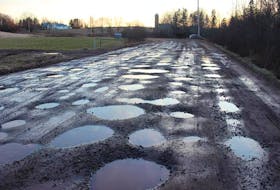Nova Scotians should get some inkling in next week’s provincial budget how Iain Rankin’s Liberal government hopes to advance one of its key goals – economic equality – but progress there seems impossible without meaningful action to address Nova Scotia’s chronic and shameful child poverty rates.
Poverty cuts across racial and ethnic lines and solutions need to do the same, but it cannot have escaped Rankin’s notice that visible minority families suffer significantly higher rates of poverty than does the overall population. So do families where a parent or child has a disability and, of course, families led by a woman alone. Indeed, about half of the single-mother families in Nova Scotia are poor, compared to roughly 30 per cent of single-father families.
We also know from reams of research that the most reliable predictor of whether poverty becomes a life-long struggle is, you guessed it, whether a person grows up in poverty.
Sociologists, economists, and other folks with graduate degrees hanging on their walls can fill you up with reasons why poverty is passed down from generation to generation, but generally it boils down to a lack of. That’s what poverty is: a lack of, and you can fill in the presumed blank with decent housing, educational, recreational and social opportunities, self-esteem, nutritious food and the list runs far longer.
Like any journey, the long journey toward economic equality – however it is defined – has to start at the beginning and, in Nova Scotia, the beginning is childhood poverty.
Rankin insiders have said that when the new premier speaks of economic equality, he’s talking about equal access to economic opportunities but, as noted above, Nova Scotian kids growing up in poverty suffer from a lack of, most especially, access to opportunities that their more affluent peers take for granted.
So, like any journey, the long journey toward economic equality – however it is defined – has to start at the beginning and, in Nova Scotia, the beginning is childhood poverty.
The predecessor and progenitor of Rankin’s government – that would be the same bunch of Liberals but led by former premier Stephen McNeil – took on poverty with a timid incrementalism that they tried to pawn off as fundamental reform of the province’s income assistance (welfare) system.
The reforms produced marginal increases in various income supports, but those were largely eaten up by inflation, because Nova Scotia does not index welfare payments to the inflation rate.
The one initiative from McNeil’s government that has real and lasting benefits, not just for poor kids but for all kids, is pre-primary, now available – free – to every four-year-old in the province.
For the most part, in recent years Nova Scotia’s government – both the elected and permanent officials – have had trouble getting past denial, if not of the child poverty problem itself, at least of the data that tells us it is worse here than elsewhere in Canada.
But advocates for the poor say that while welcome, the pre-primary program leaves gaps in affordable, accessible childcare that is a prerequisite for single mothers especially, but for many other families, who want to pull themselves and their kids out of poverty.
For the most part, in recent years Nova Scotia’s government – both the elected and permanent officials – have had trouble getting past denial, if not of the child poverty problem itself, at least of the data that tells us it is worse here than elsewhere in Canada.
Provincial officials seem bewildered that Nova Scotia is the only province where child poverty rates actually increased since the Canada Child Benefit lifted hundreds of thousands of kids out of poverty nationwide.
But year-in, year-out, in its annual report card on child and family poverty in Nova Scotia, the Canadian Centre for Policy Alternatives (CCPA) objectively assembles data from federal sources – mostly StatsCan surveys and tax filings – that put Nova Scotia at or near the bottom of the pack of provinces, with the worst, or near worst, child poverty in the nation.
Well over one-third – 37.4 per cent – of visible minority kids in Nova Scotia live below the federal poverty line.
Currently Nova Scotia’s child poverty rate – above 30 per cent in many parts of the province – is between five and 6.5 per cent higher than the national rate. Between 2000 and 2013, the year the Liberals were elected, Nova Scotia’s rate was between 3.1 and 4.3 per cent higher than the nation’s. So, we're bad and getting worse.
Well over one-third – 37.4 per cent – of visible minority kids in Nova Scotia live below the federal poverty line.
“Children in families that depend on welfare (in Nova Scotia) are poor by design,” the CCPA says, noting that income assistance rates in the province are the lowest, or among the lowest, in the nation.
And poverty is by no means confined to welfare recipients. Low wages, precarious employment, the lack of affordable childcare and affordable housing conspire to ensure Nova Scotia has more than its fair share of "working poor," too.
Economic equality suggests, at least to me, that the Rankin government intends to level the economic playing field, so everyone has an equal and fair chance to get ahead, as we used to say.
How it does that for children who, because of the impoverished circumstances of their current lives, have little or no chance of ever reaching that mythical level playing field, remains to be seen.









